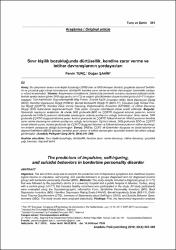| dc.contributor.author | Tunç, Pervin | en_US |
| dc.contributor.author | Şahin, Doğan | en_US |
| dc.date.accessioned | 2019-10-29T17:31:42Z | |
| dc.date.available | 2019-10-29T17:31:42Z | |
| dc.date.issued | 2019 | |
| dc.identifier.issn | 1302-6631 | |
| dc.identifier.uri | https://dx.doi.org/10.5455/apd.17298 | |
| dc.identifier.uri | https://hdl.handle.net/20.500.12294/1679 | |
| dc.description | 15th European Congress of Psychology (ECP) --JUL 12-14, 2017 -- Amsterdam, NETHERLANDS | en_US |
| dc.description | WOS: 000480458500001 | en_US |
| dc.description.abstract | Objective: The aim of this study was to analyze the predictive role of depressive symptoms and childhood psychological trauma on impulsive, self-injuring, and suicidal behaviors in groups diagnosed and not diagnosed (control group) with borderline personality disorder (BPD). Methods: The study sample included a diagnosis group (n1=72) that was followed by the psychiatry clinics of a university hospital and a public hospital in Istanbul, Turkey, along with a control group (n2=71) that included healthy volunteers who participated in the study. All study participants were evaluated using the Sociodemographic Information Form, Borderline Personality Inventory (BPI), Beck Depression Inventory (BDI), Hamilton Depression Rating Scale (HAM-D), Barratt Impulsivity Scale (BIS-11), Childhood Trauma Questionnaire (CTQ), Inventory of Statements about Self-injury (ISAS), and Suicide Behavior Questionnaire (SBQ). The study results were analyzed statistically. Findings: First, the hierarchical regression analysis revealed that the BDI and emotional abuse scores in the diagnosis group and the HAM-D in the control group were significant predictors based on the Barratt Impulsiveness Scale. Secondly, the emotional abuse score in the diagnosis group and physical neglect and HAM-D score in the control group were significant predictors of self-injury behavior inventory scores. Thirdly, BDI and sexual abuse scores in the diagnosis group and the emotional and physical abuse scores in the control group were found to be the significant predictors of suicide behavior. Conclusion: Emotional and sexual abuse during childhood and depressive symptoms (BDI) were found to be significant risk factors in terms of impulsive, self-injury and suicidal behaviors in BPD. | en_US |
| dc.language.iso | tur | en_US |
| dc.publisher | CUMHURIYET UNIV TIP FAK PSIKIYATRI ANABILIM DALI | en_US |
| dc.relation.ispartof | ANADOLU PSIKIYATRI DERGISI-ANATOLIAN JOURNAL OF PSYCHIATRY | en_US |
| dc.identifier.doi | 10.5455/apd.17298 | en_US |
| dc.identifier.doi | 10.5455/apd.17298 | |
| dc.rights | info:eu-repo/semantics/openAccess | en_US |
| dc.subject | Borderline Personality Disorder | en_US |
| dc.subject | Impulsiveness | en_US |
| dc.subject | Self-injury Behavior | en_US |
| dc.subject | Suicide Behavior | en_US |
| dc.subject | Childhood Trauma | en_US |
| dc.subject | Depressive Symptom | en_US |
| dc.title | Sınır kişilik bozukluğunda dürtüsellik, kendine zarar verme ve intihar davranışlarının yordayıcıları | en_US |
| dc.title.alternative | The predictors of impulsive, self-injuring, and suicidal behaviors in borderline personality disorder | en_US |
| dc.type | article | en_US |
| dc.department | İstanbul Arel Üniversitesi, Fen-Edebiyat Fakültesi, Psikoloji Bölümü | en_US |
| dc.identifier.volume | 20 | en_US |
| dc.identifier.issue | 4 | en_US |
| dc.identifier.startpage | 341 | en_US |
| dc.identifier.endpage | 349 | en_US |
| dc.relation.publicationcategory | Makale - Uluslararası Hakemli Dergi - Kurum Öğretim Elemanı | en_US |
| dc.department-temp | [Tunc, Pervin] Istanbul Arel Univ, Psikl Bolumu, Istanbul, Turkey -- [Sahin, Dogan] Istanbul Univ, Tip Fak, Psikiyatri ABD, Istanbul, Turkey | en_US |


















